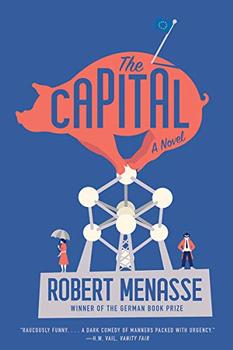Summary | Excerpt | Reviews | Beyond the Book | Read-Alikes | Genres & Themes | Author Bio

A Novel
by Robert MenasseThis article relates to The Capital
 In addition to having a very real fugitive pig running through the streets of Brussels, Robert Menasse deploys a pig leitmotif throughout The Capital that takes on a wealth of significance across the novel. Characters discuss the value of pig's ears, and pork is served in a succulent cherry beer sauce. Even fictional pigs such as Babe, Miss Piggy and Peppa Pig are referenced.
In addition to having a very real fugitive pig running through the streets of Brussels, Robert Menasse deploys a pig leitmotif throughout The Capital that takes on a wealth of significance across the novel. Characters discuss the value of pig's ears, and pork is served in a succulent cherry beer sauce. Even fictional pigs such as Babe, Miss Piggy and Peppa Pig are referenced.
As Menasse goes on to philosophize through the character of Professor Kurt van der Koot, the symbol of the pig has been made to act as "good and evil, fortune and disaster, sentimental love, contempt and deep-seated hatred, eroticism and wickedness. It was the only animal which as a metaphor covered the entire breadth of human emotions and philosophies, from the pig in clover to the filthy pig...he even ventured into the political realm and discussed the concepts of the 'Jewish pig' and 'Nazi swine'." It is fascinating to discover how many contradicting meanings one animal can come to represent.
In the Bible, Torah and Quran, the pig is said to be an unclean animal. In the New Testament episode known as the exorcism of the Gerasene demoniac, Jesus exorcises a collective of demons calling themselves "Legion" out of a man and into a herd of swine, causing the swine to run down a hill into a lake and drown themselves. For Jews and Muslims, pork is forbidden food, and its symbolism is also associated with gluttony, lust and unbridled aggression.
In contrast, pigs are considered very lucky creatures in the Chinese Zodiac, since they are generally well fed and cared for. That is why many Chinese families look upon sons born under the zodiac of the Pig as having been fortunate, believing this signifies that they'll always have someone to take care of them. Pigs are also said to be a sign of virility, as they bear large litters. As such, symbols of pigs are sometimes displayed in the bedrooms of couples trying for children.
It is believed that the ancient Egyptians had both negative and positive associations with the pig. Pigs were sacrificed to the god Osiris once a year, and this was the only time in which the Egyptians ate pork. There seem to have been myths relating to "uncleanliness" surrounding these animals, as swineherds were not permitted in temples, but at the same time, archaeologists have discovered Egyptian artifacts featuring pig designs that are believed to have been good luck charms. Pigs' teeth, blood and fat were used for medicinal purposes.
The Greeks commonly sacrificed pigs to goddesses associated with agriculture and farming, such as Gaia, Ares and Demeter, in order to ensure successful harvest seasons. Aristotle believed that pigs were "the animals most like people."
The Celts also strongly admired the pig, or boar; in their case their admiration stemmed from the animal's aggression and fierce temperament. Moccus was a Celtic pig god equivalent to the Roman Mercury. During Celtic feasts, a pig or boar would be roasted, and the best quality cuts of meat from the animal, referred to as the "hero's portion," were served to the strongest warrior of the tribe. Also in Celtic symbolism, pigs were associated with Phaea and Ceridwen – both fertility moon goddesses.
Perhaps the most well-known literary example of porcine symbolism lies in George Orwell's 1945 novella Animal Farm, in which livestock overthrow their human keepers and develop their own system of government on the farm. The novella is an allegory about Stalinism in the Soviet Union, and the pigs represent Stalin and his cronies, whom Orwell disdained for their corruption of communist principles.
Animal Farm book cover, courtesy of Book Cover Archive
Filed under Cultural Curiosities
![]() This "beyond the book article" relates to The Capital. It originally ran in June 2019 and has been updated for the
April 2020 paperback edition.
Go to magazine.
This "beyond the book article" relates to The Capital. It originally ran in June 2019 and has been updated for the
April 2020 paperback edition.
Go to magazine.
Your guide toexceptional books
BookBrowse seeks out and recommends the best in contemporary fiction and nonfiction—books that not only engage and entertain but also deepen our understanding of ourselves and the world around us.